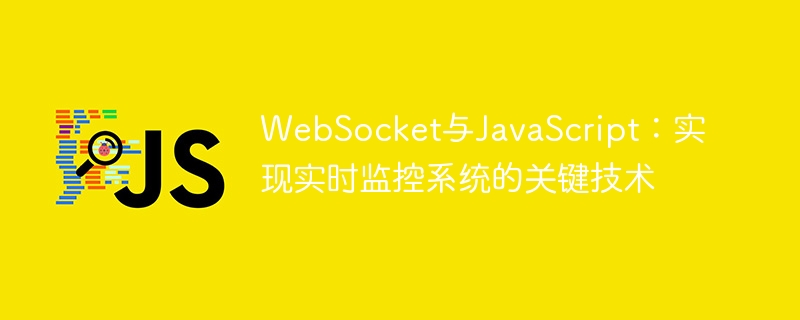Home >Web Front-end >JS Tutorial >WebSocket and JavaScript: key technologies for implementing real-time monitoring systems
WebSocket and JavaScript: key technologies for implementing real-time monitoring systems
- 王林Original
- 2023-12-17 17:30:311689browse

WebSocket and JavaScript: Key technologies for realizing real-time monitoring systems
Introduction:
With the rapid development of Internet technology, real-time monitoring systems have been widely used in various fields. a wide range of applications. One of the key technologies to achieve real-time monitoring is the combination of WebSocket and JavaScript. This article will introduce the application of WebSocket and JavaScript in real-time monitoring systems, give code examples, and explain their implementation principles in detail.
1. Introduction to WebSocket technology
WebSocket is a protocol for full-duplex communication on a single TCP connection. Compared with the traditional HTTP protocol, WebSocket has the advantages of good real-time performance, low latency, and low bandwidth usage, and is especially suitable for real-time monitoring systems.
2. JavaScript to implement WebSocket connection
It is very simple to use JavaScript to implement WebSocket connection. First, you need to create a WebSocket object and specify the connection URL:
var socket = new WebSocket("ws://localhost:8080/monitor");Among them, ws:// means using the WebSocket protocol, localhost:8080 is the address and port of the WebSocket server, and /monitor is the specific WebSocket service endpoint. .
Next, you need to define some event handling functions of WebSocket in order to communicate with the server. Common events include onopen, onmessage, onclose and onerror:
socket.onopen = function(){
console.log("WebSocket连接已经建立");
};
socket.onmessage = function(event){
console.log("收到消息:" + event.data);
};
socket.onclose = function(){
console.log("WebSocket连接已经关闭");
};
socket.onerror = function(error){
console.log("WebSocket连接发生错误:" + error);
};Through these event processing functions, real-time data interaction with the server can be achieved.
3. Server-side code example
WebSocket server-side is implemented using Node.js and WebSocket library. The following is a simple WebSocket server-side code example:
const WebSocket = require('ws');
const wss = new WebSocket.Server({ port: 8080 });
wss.on('connection', function connection(ws) {
console.log('WebSocket连接已建立');
// 监听客户端发来的消息
ws.on('message', function incoming(message) {
console.log('收到消息:', message);
});
// 发送消息给客户端
ws.send('欢迎连接WebSocket服务器');
});The above code creates a WebSocket server, outputs logs when the client establishes a connection with the server, receives and outputs messages from the client, and sends messages to The client sends a welcome message.
4. Application in real-time monitoring system
In the real-time monitoring system, the combination of WebSocket and JavaScript can realize the push and reception of real-time data. For example, a temperature monitoring system can push the temperature data collected by the sensor to the monitoring interface in real time through WebSocket, and the monitoring interface can monitor the sensor data changes through WebSocket. The following is a simple monitoring interface code example:
实时温度监控系统
实时温度监控系统
<script>
var socket = new WebSocket("ws://localhost:8080/monitor");
socket.onmessage = function(event){
var temperature = document.getElementById("temperature");
temperature.innerHTML = "当前温度为:" + event.data;
};
</script>
The above code creates a simple monitoring interface, which monitors the temperature data transmitted from the server through WebSocket and displays it on the interface in real time.
Conclusion:
The combination of WebSocket and JavaScript is one of the key technologies to implement a real-time monitoring system. Through WebSocket and JavaScript, real-time data can be pushed and received in the real-time monitoring system. The code example given above is a simple real-time temperature monitoring system for readers' reference. In practical applications, further development and optimization can be carried out according to specific needs.
The above is the detailed content of WebSocket and JavaScript: key technologies for implementing real-time monitoring systems. For more information, please follow other related articles on the PHP Chinese website!

